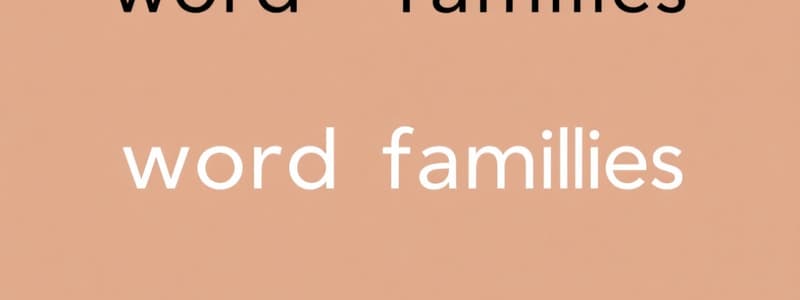Podcast
Questions and Answers
Which word is not associated with movement?
Which word is not associated with movement?
- rule (correct)
- crawl
- ride
- climb
Which of the following words can refer to a type of animal?
Which of the following words can refer to a type of animal?
- drawer
- robber
- tiger (correct)
- hill
Identify the word that is related to a form of entertainment.
Identify the word that is related to a form of entertainment.
- paint
- swing
- show (correct)
- court
Which word signifies a method of securing or managing?
Which word signifies a method of securing or managing?
Which word is least likely to describe an object typically found in a home?
Which word is least likely to describe an object typically found in a home?
Match the following words with their meanings:
Match the following words with their meanings:
Match the following items with their uses:
Match the following items with their uses:
Match the following words associated with animals:
Match the following words associated with animals:
Match the following words with their forms of movement:
Match the following words with their forms of movement:
Match the following words with the conditions they describe:
Match the following words with the conditions they describe:
Study Notes
Word Families
- Short words have fewer letters than long words.
- -ing words show an action happening, like "swimming" or "singing."
- -ed words show an action that already happened, like "walked" or "played".
- -er words often describe something that does an action, like "runner" or "writer."
Rhyming Words
- Short and sport sound alike at the end.
- Pot and hot have the same ending sound.
- Hat and cat rhyme.
- Show and slow rhyme, too.
- Slide and ride sound alike at the end.
- Rule and school rhyme.
- Horse and course have the same ending sound.
- House and mouse rhyme.
- Paint and saint rhyme.
- Point and joint have the same ending sound.
- Chase and face rhyme.
- Chose and nose sound alike at the end.
- Crawl and small rhyme.
- Tiger and bigger have the same ending sound.
- Drawer and power rhyme.
- Side and wide sound alike at the end.
- Shelf and elf rhyme.
- Laugh and staff have the same ending sound.
- Count and fount rhyme.
- Court and sort have the same ending sound.
- Both and cloth rhyme.
- Bath and path sound alike at the end.
- Swing and thing rhyme.
- Put and nut have the same ending sound.
- Ring and sing rhyme.
- Rug and bug sound alike at the end.
- Robber and sobbing have the same ending sound.
- Rabbit and habit rhyme.
- Hil and will sound alike at the end.
- Sleep and sheep rhyme.
- Plane and rain have the same ending sound.
- Control and goal rhyme.
- Climb and time sound alike at the end.
Short Words
- Short Vowels: Many of the words have short vowels, such as 'sport', 'pot', 'hat', 'hot', 'show', 'robber', 'rabbit'. These words are typically monosyllabic, meaning they have one syllable.
- Consonant Blends: Several words include consonant blends, like 'short', 'crawl', 'climb', 'sleep'. These blends create a unique sound by combining two or more consonants.
- Digraphs: The words 'both', 'bath', 'sheep' feature digraphs (two letters representing one sound). This makes the pronunciation more complex, requiring learners to recognize specific letter combinations.
Rhyming Words
- Many words rhyme with each other, such as 'short' and 'sport', 'hot' and 'pot', 'house' and 'horse', 'robber' and 'rabbit', and 'sheep' and 'sleep'. This helps with memorization as the familiar rhyme pattern aids in recall.
Action Words
- Many of the words describe actions: 'ride', 'rule', 'chase', 'chose', 'crawl', 'climb', 'sleep', 'swing', 'put', 'laugh', 'count'. This makes the list more dynamic and engaging for learners.
Common Objects
- The list contains several words referring to common objects: 'sport','horse', 'house', 'hat', 'paint', 'rug', 'shelf', 'drawer', 'plane'. This makes the list feel familiar and relatable to young learners.
Nouns and Verbs
- The list includes both nouns, naming things (e.g., 'horse', 'house', 'tiger', 'side'), and verbs, describing actions (e.g., 'ride', 'crawl', 'laugh', 'count'). This provides a basic understanding of word types and their functions.
Studying That Suits You
Use AI to generate personalized quizzes and flashcards to suit your learning preferences.
Description
This quiz focuses on understanding word families, including short, -ing, -ed, and -er words, as well as identifying rhyming words. Challenge your knowledge on how these words are used in English and reinforce your vocabulary skills. Perfect for students looking to enhance their language proficiency.




